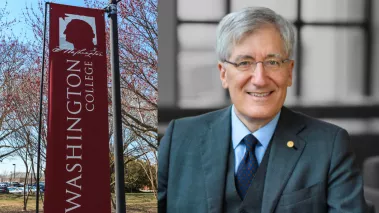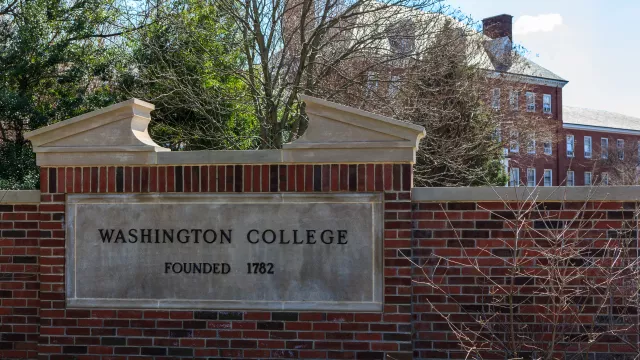Table of Contents
In wake of Robert George event shoutdown, Washington College vows to improve response to disruptive protests

George Sheldon / Shutterstock.com
Princeton professor Robert George was unable to speak at an event at Washington College because of protesters.
There is a significant difference between peaceful, nondisruptive protests of on-campus events and disruptions that shut them down. Students can exercise the full extent of their First Amendment rights by protesting a speaker with whom they disagree. But that protest cannot cross the line into substantially disrupting an event so that it cannot proceed — as we have seen happen time and time again.
Earlier this month, Princeton professor Robert George’s appearance at Washington College provided yet another example of what’s known as the “heckler’s veto.” Protesters entered the event and drowned out George’s speech, eventually forcing him to leave — while security officers stood by and watched as the protesters shouted and played loud music to prevent George from speaking and those in attendance from hearing him. While the college publicly denounced the disruption, FIRE called on it to do more by educating its security officers on their responsibility to intervene and remove disruptive protesters.
In response to FIRE’s letter, Washington College President Michael J. Sosulski told us that part of the school’s post-incident analysis “will include ensuring that [its] Public Safety officers are prepared to engage in ways that will not permit events to be disrupted or abruptly canceled.”
The protesters violated the rights of those students exercising their “freedom to hear” George speak.
FIRE is encouraged by this response because, while belated, it acknowledges the college’s responsibility to educate its security officers on how to engage with disruptive protesters to ensure expressive events can continue.
Sosulski added that Washington College students in attendance to listen to George’s speech heavily outnumbered the small but vocal group of disruptors, with two individuals being primarily responsible for the disruption:
We fully agree that things did not go as we had hoped despite our efforts to provide outlets to channel the energies of some of our students. Let me add that there were dozens of Washington College students who attended the event in the spirit of engaged dialogue. As an institution we value our role in shaping engaged citizen leaders and we strive to instill the ability for reasoned disagreement. I am proud that so many of our students attended the lecture prepared to listen to Professor George’s perspective and ask questions of him and his positions.
The protesters violated the rights of those students exercising their “freedom to hear” George speak. Security officers need to be willing to remove any disruptive protesters who threaten the continuation of an event. (Of course, any protesters subsequently subjected to disciplinary processes must receive their full due process rights.)

The heckler’s veto strikes again — this time, at Washington College
Protesters at Maryland’s Washington College allegedly disrupted a campus speaker so substantially that the event was forced to end early.
A report from Inside Higher Ed indicates that Washington College security officers understood their charge as precluding them from intervening in nonviolent protests, despite college policies stating that the college will “intervene in the conduct of protests and demonstrations when others are deprived of their rights or when operations of the College are disrupted.”
Washington College can and should remedy this apparent contradiction by educating the security officers of their obligation to ensure expressive events can proceed.
FIRE commends Washington College for sounding the right message publicly and vowing to do better in the future by ensuring that disruptive protesters cannot force campus events to shut down. We also commend the college for maintaining good policies on paper. But without proper enforcement, those policies are lacking. We will continue to monitor the situation to ensure the college follows through on its commitments.
FIRE defends the rights of students and faculty members — no matter their views — at public and private universities and colleges in the United States. If you are a student or a faculty member facing investigation or punishment for your speech, submit your case to FIRE today. If you’re a faculty member at a public college or university, call the Faculty Legal Defense Fund 24-hour hotline at 254-500-FLDF (3533). If you’re a college journalist facing censorship or a media law question, call the Student Press Freedom Initiative 24-hour hotline at 717-734-SPFI (7734).
Recent Articles
Get the latest free speech news and analysis from FIRE.

VICTORY: Court vindicates professor investigated for parodying university’s ‘land acknowledgment’ on syllabus

Can the government ban controversial public holiday displays?

DOJ plan to target ‘domestic terrorists’ risks chilling speech


